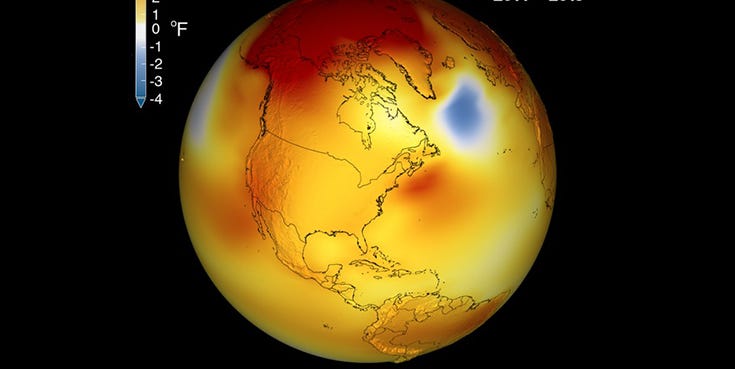
Getting accurate data is a fundamental part of the scientific process. That process, in the case of some data sets, can have national and global ramifications. That's why NASA studies its own research on climate change.
Analyzing data going back to the 1880s, NASA now has the good (or bad, depending on how you view things) news that its warnings about man-made rising temperatures are extremely accurate—within 1/20th of a degree Celsius, in fact.
The focus of NASA's study was the accuracy of what's known as the GISS surface Temperature Analysis, or GISTEMP for short. The GISTEMP is compiled by NASA’s Goddard Institute for Space Science Studies (GISS), a laboratory in the agency's Earth Sciences division based at Columbia University in New York City.
GISS studies natural and anthropogenic changes in the Earth's climate, ranging from seasonal events like a polar vortex to the rising temperatures across the planet.
The GISTEMP is a crucial GISS publication that's meant to show an estimate of global surface temperature change. Only four organizations around the world keep an annual record of that temperature change: GISS, NOAA, and Japan and England's meteorological agencies.
Of those four, GISS is considered to have the widest focus, covering 99 percent of the planet compared to Japan's 85 percent, as well as the most detailed information. When NASA publishes its annual climate data, it calls on the GISTEMP.
To get that data, the GISTEMP relies on estimates of the temperatures between weather stations using data from the closest stations. That process is referred to as interpolation.
The purpose of this latest study was to determine's the GISTEMP's uncertainty with its interpolation. While scientists generally place a great amount of confidence in their work, they also acknowledge that few pieces of information can fully be understood to the most minute detail. That's where the term uncertainty comes into play.
“Uncertainty is important to understand because we know that in the real world we don't know everything perfectly,” says Gavin Schmidt, director of GISS and a coauthor on the study, in a press statement. “All science is based on knowing the limitations of the numbers that you come up with, and those uncertainties can determine whether what you're seeing is a shift or a change that is actually important.”
What Schmidt and co. found wasn't much a surprise: The data NASA gathers is extremely accurate. There were a couple of unknowns, of course. "Individual and systematic changes in measuring temperature over time were the most significant source of uncertainty," according to the press statement.
Data interpolation played a part, as well as changing systems over time: If a weather station shifted the metrics used to study the climate, which has happened over time, then it's possible some detail gets lost in translation.
But on the whole, everything was dead on. GISS values are likely accurate to within 0.09 degrees Fahrenheit (0.05 degrees Celsius) in recent decades, and 0.27 degrees Fahrenheit (0.15 degrees C) at the beginning of the nearly 140-year record.
“We've made the uncertainty quantification more rigorous, and the conclusion to come out of the study was that we can have confidence in the accuracy of our global temperature series,” says lead author Nathan Lenssen, a doctoral student at Columbia University. “We don't have to restate any conclusions based on this analysis.” Schmidt referred to the uncertainty as "very small."
The GISS scientists also took the opportunity to reaffirm what they've already told the public: "2016 was very probably the warmest year in the record, with an 86.2 percent likelihood. The next most likely candidate for warmest year on record was 2017, with a 12.5 percent probability."
https://www.popularmechanics.com/science/environment/a27613989/nasa-climate-data-accurate/
2019-05-29 13:00:00Z
CBMiWmh0dHBzOi8vd3d3LnBvcHVsYXJtZWNoYW5pY3MuY29tL3NjaWVuY2UvZW52aXJvbm1lbnQvYTI3NjEzOTg5L25hc2EtY2xpbWF0ZS1kYXRhLWFjY3VyYXRlL9IBXGh0dHBzOi8vd3d3LnBvcHVsYXJtZWNoYW5pY3MuY29tL3NjaWVuY2UvZW52aXJvbm1lbnQvYW1wMjc2MTM5ODkvbmFzYS1jbGltYXRlLWRhdGEtYWNjdXJhdGUv
Bagikan Berita Ini















0 Response to "NASA's Climate Data Extremely Accurate, Says NASA - Popular Mechanics"
Post a Comment